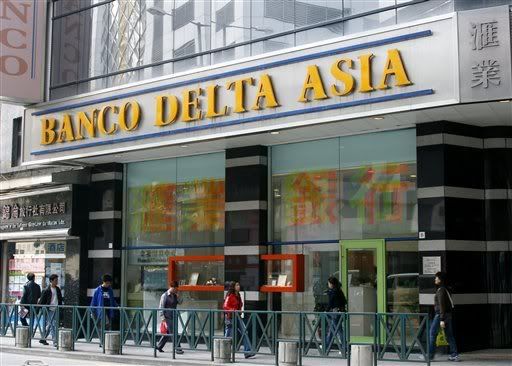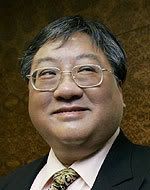Killing The Chicken To Scare The Monkey
 Remember last summer, when the Dems went ballistic over North Korea's nuclear test, yelling at the White House about wasting resources in Iraq when countries like NoKo posed a more clear and present danger?
Remember last summer, when the Dems went ballistic over North Korea's nuclear test, yelling at the White House about wasting resources in Iraq when countries like NoKo posed a more clear and present danger?It was bluster, for sure, because they never would have gone for any strong, military-backed measures againt L'il Kim and his Krew in Pyongyang -- and, it turns out, it was ignorant bluster at that, because all the while, the Bush Admin. was patiently attacking a much more vulnerable target. That's it in the photo, Banco Delta Asia, in the greasy little commercial hub of Macao, near Hong Kong.
 The tiny bank run by Stanley Au and operated as a closely held family business, was the chicken in an old Chinese proverb that says you kill the chicken to scare the monkey. You'll get it soon enough.
The tiny bank run by Stanley Au and operated as a closely held family business, was the chicken in an old Chinese proverb that says you kill the chicken to scare the monkey. You'll get it soon enough.As reported in a great WSJ article today (subscribers only, probably)
the Bush Admin. had decided to use Section 311 of the good ol' Patriot Act to put Uncle Sam's big thumb flat on the back of Banco Delta because the bank was a financial conduit for Pyongyang. Section 311 allows the U.S. to bar its banks from doing business with banks like Banco Delta, which are allegedly involved in illicit businesses. Its provisions had previously been used against banks in Syria and other happy go lucky places.
Banco Delta was hadly the biggest fish in the NoKo financial pond, but it was a good choice for the tactic.
By early 2005, Bush administration officials were ready to take the next big step. Six-party talks among the U.S., North Korea, China, Japan, Russia and South Korea to end Pyongyang's nuclear program had stalled seven months earlier. U.S. officials fretted that the North's erstwhile ally China wasn't doing enough to pressure Pyongyang. ...After rejecting a proposal to target the Bank of China's Macau branch for fear of angering the Chinese [the monkey in the old proverb], the administration focused on Banco Delta Asia, a small, family-run bank with 30,000 customers and $389 million in deposits. Founded in the 1930s, BDA had nine branches in Macau and two in nearby Hong Kong. U.S. intelligence officials had been following its interactions with North Korean businesses since the mid-1990s and saw it as a major node in North Korea's foreign financial dealings. ...
On Sept. 15, 2005, the U.S. publicly accused BDA of being "a willing pawn for the North Korean government," alleging that it had helped conduct "surreptitious, multimillion-dollar cash deposits and withdrawals" for front companies involved in counterfeit currency, drugs and other illegal activities for more than 20 years. The U.S. said it was weighing whether to bar all U.S. banks from doing any business with BDA.
BDA's chairman, Stanley Au, disputed the allegations. But by noon the next day, long lines of depositors had withdrawn more than $40 million in cash from the bank. The Macau Monetary Authority set up a team to investigate BDA, and two days later, took over its management and froze more than 50 North Korean accounts with about $25 million in deposits.
That may not seem like much money, but all of a sudden, banks in China, Vietnam, Mongolia and elsewhere got jittery, suddenly feeling like Cindy Sheehan about the Patriot Act. They began to stop transacting business with Pyongyang, and L'il Kim felt the pinch immediately. By killing the chicken, we had scared the daylights out of the monkey.
Shortly after this, the stalled six-party talks suddenly fired up again.
But when negotiators met again in Beijing two months later, North Korea's envoy, Kim Kye Gwan, lashed out during a private plenary session. He accused the U.S. of heaping more sanctions on his country and called the BDA action "intolerable," says one U.S. official who was present.
"At first we thought it was one of those typical, blustery North Korean speeches that often go away like a summer shower," he says. "But this one just stayed. They never stopped talking about it."
The Chinese were plenty miffed, too. Like Jack Bauer, the U.S. negotiators looked around at the mayhem they had created and said, "Got 'em just where we want 'em." As negotiations moved forward, the unfreezing of Banco Delta accounts has been center stage because the North Koreans know that once those accounts are freed, other financial doors will re-open.
A brilliant strategy, well played. So, of course, expect the Dems to attack it any day now, probably calling hearings on why the Bush Admin. allowed the accounts to unfreeze without exacting tougher measures to stop that country's counterfeiting and smuggling operations.
Perhaps Pelosi, Reid & Co. don't understand Chinese proverbs. Counterfeiting is the chicken, and in this case, we're just going to scare the chicken, we're letting it live a few more days so we can kill the monkey, the NoKo nuke program.
You can bet your bottom dollar (quite possibily counterfeited by NoKo) that the Mullahs in Tehran have been tracking this story very closely, because we've launched a similar financial strike against them.
Labels: Foreign policy, Iran, North Korea




<< Home